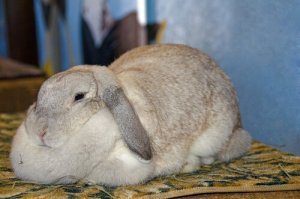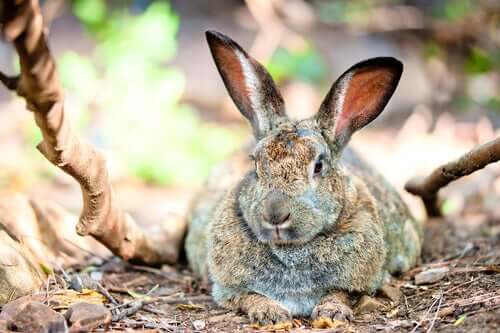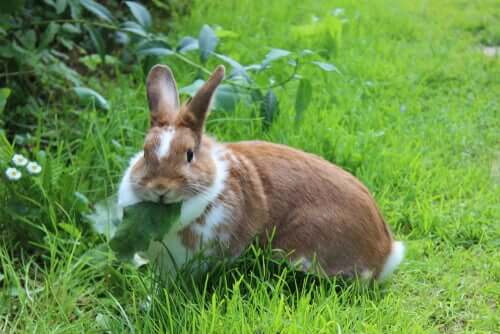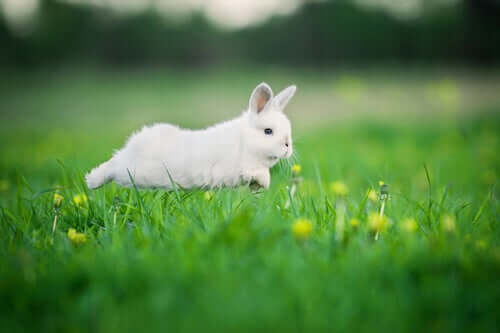Obesity in Rabbits - Causes and Symptoms


Written and verified by biochemistry Luz Eduviges Thomas-Romero
Believe it or not, obesity in rabbits can result in some serious illnesses. It also plays an important role in their health, just like it does in overweight humans, dogs, cats, and even birds. An excess of weight is a huge problem for the welfare of your pets and, as such, you should address it.
Reasons for obesity in rabbits
Eating too much is usually the main reason for obesity in rabbits, but this factor alone may not affect a very active rabbit because exercise can often keep the extra weight at bay.
Inactivity
If a rabbit uses fewer calories than they eat, then they’ll gain weight. Sadly, many pet rabbits spend their entire lives in cages so obesity is a common problem in them.
Rabbits are animals who jump and run in their natural habitats and they won’t exercise enough under cruel confinement.
Sugar and sweets
There is a commercial phenomenon when it comes to getting and providing candy to rabbits. Many pet owners fall for advertising lies and opt to give their rabbits whatever their local pet shop labels as food for rabbits.
How to recognize an obese rabbit

An obese rabbit is one that has more body fat than is healthy for their body size. Each breed has a different set of specific standards that indicate the normal size and weight of that particular breed.
These rules aren’t too rigid, but rather you should use them as a guide to evaluating whether your rabbit’s weight is optimal for their body.
There’s also a scale that grades a rabbit’s body condition. This is helpful when it comes to monitoring your rabbit’s weight. Most body condition scores come on a scale of one to five, so three is the perfect score.
If you can’t feel your rabbit’s ribs at all or you have to put some extra effort to feel them then it means they’re overweight. Your veterinarian can help you confirm this process, as it’ll all depend on the animal’s health.
Consequences of obesity in rabbits

Obesity in rabbits increases their propensity for many diseases. Among them, myiasis, pododermatitis, preeclampsia, and even paralytic ileus (or gastrointestinal stasis).
Myiasis
This is a form of worm infestation. Because overweight rabbits can’t clean themselves properly, they’re more likely to have dirty areas in their bodies that attract flies. One of the most common areas is the rectum and genital area.
Flies lay their eggs there and these become worms. You probably won’t notice it if you don’t regularly check and bathe your rabbit. The symptoms are secondary infections, irreparable wounds, and even internal damage.
Pododermatitis
This condition that affects their feet is often due to a sedentary lifestyle or obesity in the rabbit, as there’s too much pressure on their feet.
In addition, rough and impure surfaces contribute to this inflammation. Pododermatitis lesions are painful and are difficult to treat and clean. You must do regular checkups on the animal to be aware of the first signs. An abnormal gait is the most common one.
Gastrointestinal stasis (paralytic ileus)
This is the most common problem in pet rabbits because of its many causes. Obesity alone doesn’t make a rabbit stop eating and develop paralytic ileus. But, due to all the other problems that may be associated with obesity, this is definitely a high-risk factor.
How to prevent and reverse obesity in rabbits
Obviously, the easiest thing to do to help prevent obesity in a pet rabbit is to feed them a wholesome diet. Choosing the right type and amount of food and providing a good amount of exercise are necessary to keep this kind of animal at their ideal weight.
Rabbit diet
You must keep in mind that hay is essential to a rabbit’s health and should be the basis of their diet. Kibble and treats are the most common reasons for weight gain, so you should limit them in adult rabbits.
In addition, you must also limit sugary and fatty foods such as sunflower seeds and many other types of cereals. Instead, give them a strawberry or a carrot as a special gift. This is as tasty to them as a lump of sugar.
Exercise prevents obesity in rabbits

You must give your rabbit the chance to run and exercise. Ideally, this animal should never be in a cage but in a large room or some other large area with pens where they can live but also explore.
Activity won’t just stimulate their mind but it’ll also keep them slim and mentally healthy. If you have no choice but to cage your rabbit, you can still give them opportunities to exercise.
There are some rabbit harnesses with which to ensure that your pet doesn’t enter an unsafe area. However, you must allow them at least three hours of playtime and exercise every day if you keep them restricted throughout the day.
Keep in mind that this is an animal that’s used to running several miles a day in the wild. Thus, the least you can do is let them play freely in your home for a few hours of every day.
Believe it or not, obesity in rabbits can result in some serious illnesses. It also plays an important role in their health, just like it does in overweight humans, dogs, cats, and even birds. An excess of weight is a huge problem for the welfare of your pets and, as such, you should address it.
Reasons for obesity in rabbits
Eating too much is usually the main reason for obesity in rabbits, but this factor alone may not affect a very active rabbit because exercise can often keep the extra weight at bay.
Inactivity
If a rabbit uses fewer calories than they eat, then they’ll gain weight. Sadly, many pet rabbits spend their entire lives in cages so obesity is a common problem in them.
Rabbits are animals who jump and run in their natural habitats and they won’t exercise enough under cruel confinement.
Sugar and sweets
There is a commercial phenomenon when it comes to getting and providing candy to rabbits. Many pet owners fall for advertising lies and opt to give their rabbits whatever their local pet shop labels as food for rabbits.
How to recognize an obese rabbit

An obese rabbit is one that has more body fat than is healthy for their body size. Each breed has a different set of specific standards that indicate the normal size and weight of that particular breed.
These rules aren’t too rigid, but rather you should use them as a guide to evaluating whether your rabbit’s weight is optimal for their body.
There’s also a scale that grades a rabbit’s body condition. This is helpful when it comes to monitoring your rabbit’s weight. Most body condition scores come on a scale of one to five, so three is the perfect score.
If you can’t feel your rabbit’s ribs at all or you have to put some extra effort to feel them then it means they’re overweight. Your veterinarian can help you confirm this process, as it’ll all depend on the animal’s health.
Consequences of obesity in rabbits

Obesity in rabbits increases their propensity for many diseases. Among them, myiasis, pododermatitis, preeclampsia, and even paralytic ileus (or gastrointestinal stasis).
Myiasis
This is a form of worm infestation. Because overweight rabbits can’t clean themselves properly, they’re more likely to have dirty areas in their bodies that attract flies. One of the most common areas is the rectum and genital area.
Flies lay their eggs there and these become worms. You probably won’t notice it if you don’t regularly check and bathe your rabbit. The symptoms are secondary infections, irreparable wounds, and even internal damage.
Pododermatitis
This condition that affects their feet is often due to a sedentary lifestyle or obesity in the rabbit, as there’s too much pressure on their feet.
In addition, rough and impure surfaces contribute to this inflammation. Pododermatitis lesions are painful and are difficult to treat and clean. You must do regular checkups on the animal to be aware of the first signs. An abnormal gait is the most common one.
Gastrointestinal stasis (paralytic ileus)
This is the most common problem in pet rabbits because of its many causes. Obesity alone doesn’t make a rabbit stop eating and develop paralytic ileus. But, due to all the other problems that may be associated with obesity, this is definitely a high-risk factor.
How to prevent and reverse obesity in rabbits
Obviously, the easiest thing to do to help prevent obesity in a pet rabbit is to feed them a wholesome diet. Choosing the right type and amount of food and providing a good amount of exercise are necessary to keep this kind of animal at their ideal weight.
Rabbit diet
You must keep in mind that hay is essential to a rabbit’s health and should be the basis of their diet. Kibble and treats are the most common reasons for weight gain, so you should limit them in adult rabbits.
In addition, you must also limit sugary and fatty foods such as sunflower seeds and many other types of cereals. Instead, give them a strawberry or a carrot as a special gift. This is as tasty to them as a lump of sugar.
Exercise prevents obesity in rabbits

You must give your rabbit the chance to run and exercise. Ideally, this animal should never be in a cage but in a large room or some other large area with pens where they can live but also explore.
Activity won’t just stimulate their mind but it’ll also keep them slim and mentally healthy. If you have no choice but to cage your rabbit, you can still give them opportunities to exercise.
There are some rabbit harnesses with which to ensure that your pet doesn’t enter an unsafe area. However, you must allow them at least three hours of playtime and exercise every day if you keep them restricted throughout the day.
Keep in mind that this is an animal that’s used to running several miles a day in the wild. Thus, the least you can do is let them play freely in your home for a few hours of every day.
All cited sources were thoroughly reviewed by our team to ensure their quality, reliability, currency, and validity. The bibliography of this article was considered reliable and of academic or scientific accuracy.
- Varga, M. (2013). Textbook of Rabbit Medicine E-Book. Elsevier Health Sciences.
- Rooney, N. J., Blackwell, E. J., Mullan, S. M., Saunders, R., Baker, P. E., Hill, J. M., … & Held, S. D. (2014). The current state of welfare, housing and husbandry of the English pet rabbit population. BMC research notes, 7(1), 942.
- Stapleton, N. (2014). The chubby bunny: a closer look at obesity in the pet rabbit. The Veterinary Nurse, 5(6), 312-319.
This text is provided for informational purposes only and does not replace consultation with a professional. If in doubt, consult your specialist.








